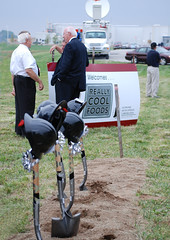 In 2007, organic prepared food producer Really Cool Foods announced that it would be building a multi-plant production complex in Cambridge City, Indiana and investing over $100 million in the area. The announcement was met with great joy and significant incentives from state and local governments:
In 2007, organic prepared food producer Really Cool Foods announced that it would be building a multi-plant production complex in Cambridge City, Indiana and investing over $100 million in the area. The announcement was met with great joy and significant incentives from state and local governments:
The Indiana Economic Development Corp. offered Really Cool Foods up to $3.05 million in performance-based tax credits, up to $165,000 in training grants and will provide Cambridge City officials with a $200,000 grant to assist in off-site infrastructure improvements needed for the project. Wayne County officials offered the company 50 acres of land, $165,000 in grants and a 10-year property tax abatement.
The facility opened in October of 2008 with 250 of the projected 1,000 jobs to start, and over the last few years the company has had numerous challenges reaching initially estimated milestones of investment and jobs created.
Today, the company told workers who showed up for their morning shift that the facility was closing, and in a press release sent after 9 AM, announced the company is shutting down.
A couple of initial thoughts and questions about this unfortunate announcement:

